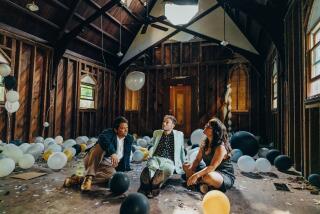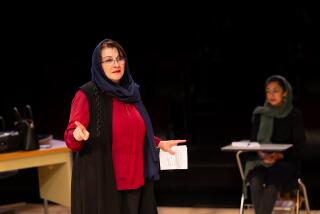STAGE REVIEW : Itchey Foot Brings Poet to Life in ‘Larkin’
- Share via
The Mark Taper Forum’s Sundays at the Itchey Foot have always been modest affairs--simple lighting, seldom more than three actors, literary texts (rather than plays) and reading stands to hold them. It’s fitting that an equally low-key poet, Philip Larkin, is the subject of the Itchey Foot’s latest offering.
It’s also always something of a small triumph when the scale of presentation fits the writer like a good piece of tailoring. Adapter/director Ron Hutchinson (playwright of “Rat in the Skull” and “Babbitt”) has trimmed and sewn Larkin’s poetry, together with an interview he granted to Paris Review, into a small, intimate piece fittingly titled “Larkin.”
One of the few real disappointments audiences will have is going out and tracking down a collection of Larkin’s verse. His work is nearly unavailable, perhaps because he’s British and was not a multiple-prize winner. His name we’ve heard, but how many of us have actually read him?
The only other shortcoming of the show is that listening to William Glover (as the poet) and Cristine Rose (as the Paris Review interviewer) is no substitute for reading him. He is just as spare on the page as he sounds on stage, but with a whorl of complexity a listening can’t absorb.
In fact, Larkin condemns poetry readings in the interview. They’ve been confused with music recitals, he argues; one needs music performed, because relatively few people read notes. But poetry’s meant to be read. Alone.
Ever the solitaire, he also loathes theater (“too public”). He despises Charlie Parker and the jazz he spawned, mainly because he loves the jazz of Louis Armstrong and Sidney Bechet. But also because Armstrong played in the diatonic scale, and Parker messed around in the chromatic scale. Larkin backs up his opinions.
Because of his prejudices, his opinion of Hutchinson’s show might be scathing--were he alive to see it (he died in 1985). “Larkin,” after all, is part theater (the interview) and part poetry reading, with backing on reed instruments by the very Charlie Parker-influenced Kurt Festinger. Hutchinson is an unsparing playwright, so there might be some playful nudging of the man beyond the grave going on here. Larkin’s work is ours, Hutchinson is saying, not his.
It’s probably just. Though the interview reveals Larkin as a modest man and lifelong bachelor who ran a university library by day, with a few hours of writing and some telly by night, he’s immodestly proprietary about his solitude. Never a misanthropist, Larkin does like to come off as being somewhat anti-social, in the way intensely bookish people can.
He’s a collection of oddities--no sexual intercourse until 41, never left England, averaged only three poems a year, if that--but it’s just the right collection, apparently, to produce fine verse. That’s what matters, he’d say, because we’re all going to die anyway.
If there’s a subject Hutchinson and the Paris Review exchange shy away from, it’s Larkin’s death obsession. Odd, because it’s in almost every poem. Perhaps the thinking was that that might be too much after an Itchey Foot dinner (try the quiche), but it’s worth rethinking.
Glover slightly resembles Larkin, and for what’s essentially a reading, Glover’s performance is half in his facial expressions. He wittily projects Larkin’s boredom with the interview (some of the questions are fatuous), and acidly delivers the artist’s impatience with the outside world. Rose is a good reader, and suggests a journalist contending with a tough host.
At 801 W. Temple St. on Sundays, 6 p.m., through Oct. 16. Tickets: $6; (213) 972-7231.
More to Read
The biggest entertainment stories
Get our big stories about Hollywood, film, television, music, arts, culture and more right in your inbox as soon as they publish.
You may occasionally receive promotional content from the Los Angeles Times.










